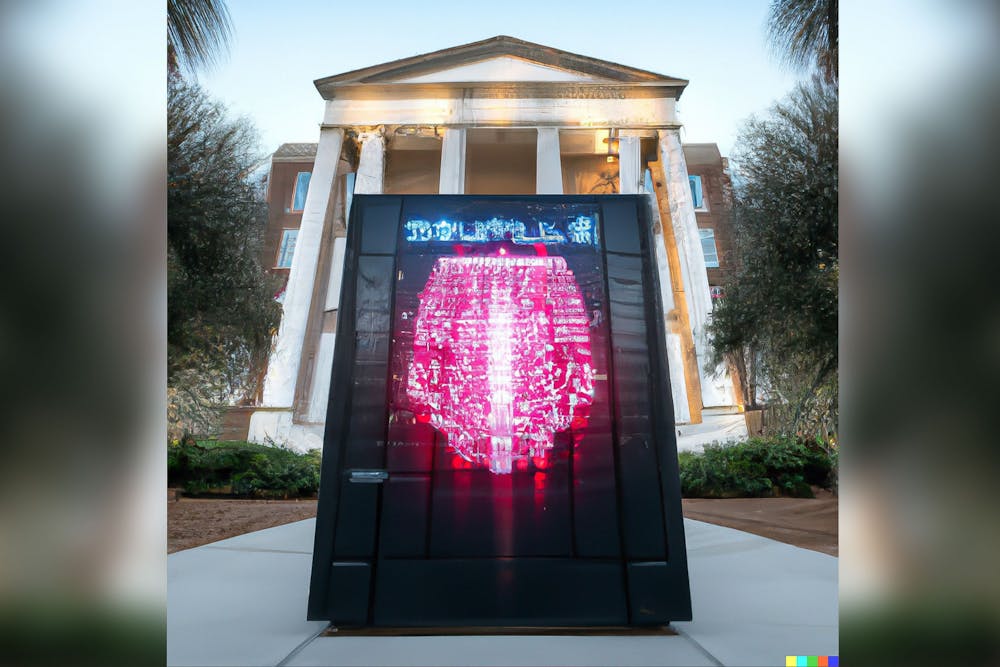Chat Generative Pre-trained Transformer (ChatGPT) is simple: You type in a text prompt, and it spits out surprisingly intelligent-sounding text such as love letters, short stories, movie recommendations and even recipes. What worries educators is its ability to produce essays just as well or even better than what a high school student could.
Eric Robinson, an associate professor in the School of Journalism and Mass Communications, said educators will have to adapt and write questions that the chatbot cannot give satisfactory answers to.
"It's remarkable. I've played it a little bit and it is pretty good at answering questions that I threw at it," Robinson said. "It does present a little bit of a challenge to us as professors."
Robinson said he already added a section to the plagiarism portion of his syllabus specifically disallowing the use of ChatGPT and other AI systems to complete coursework and assignments.
Jeff Stensland, USC's director of public relations, said students using chatbot technology and representing the work as their own is an act of plagiarism and a violation of the honor code.
To see what else the chatbot can offer, there will be training sessions for faculty through the Center for Teaching Excellence on how to adapt assignments so that cheating is impossible and how to incorporate the technology into lessons.
"It's obviously a very new and evolving technology, so there will be much more conversation in the weeks, months and years ahead," Stensland said.
Tobias Heinrich, an associate professor in USC's Department of Political Science, introduced his class to ChatGPT on the first day of class.
"I made the decision there's no point in hiding it. Let's just sort of tackle this head-on," Heinrich said.

After learning about it late last year, Heinrich said he spent a lot of time over winter break tinkering with the chatbot and learning how he could use it in the classroom. He came up with AI-assisted question-and-answer sessions where students use ChatGPT to ask questions about class material and then discuss the conclusions.
"Let (ChatGPT) produce sort of an answer to something that matters in the context of class, and then let's discuss, dissect (and) maybe reengineer the answer," Heinrich said.
Heinrich said he is doubling down on the honor code by trusting students to be honest and follow the instructions. He said the chatbot may make it easier for students to get a D+ rather than failing a class, but it will not adequately complete all their coursework and will not be the best for the student's learning long-term.
"Is it possible that you spend half an hour Friday afternoon instead of Saturday (at a library)? Surely," Heinrich said. "Not doing the Saturday library part will come with costs."
However, ChatGPT is not a human and is not able to tell right from wrong or truth from lies, potentially making the chatbot an untrustworthy source of information.
When learning how to use it, Heinrich attempted to use ChatGPT as his own personal tutor for an obscure topic he was curious about and asked it questions like a pupil would with a mentor.
"It showed me an example, (and) it has a perfectly reasonable explanation," Heinrich said. "The example is just wrong. It's just flat-out wrong."
The chatbot is capable of generating generic text such as corporate-sounding press releases or highly formulaic news articles. Heinrich said simple assignments may become automated as a result.
Robinson said the internet and cell phones have already changed education and that ChatGPT is just another iteration of that evolution.
"(ChatGPT) will just become part of society to the point where no one's questioning it. It will just become part of the fabric of our world like the internet has," Robinson said.
Correction: A previous version of this story said Eric Robinson was an associate professor in the USC School of Law. We recognize this mistake and have fixed it.

